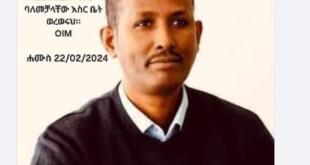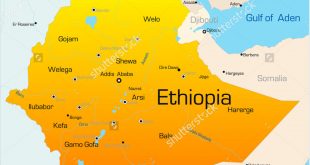By Gurraacho Silgaa
Since the
OLF split into Transitional Authority (QC) and
Shanee Gumii (SG) in 2001, the concept of reconciliation has emerged as a central theme of political discourse within the
Oromo community in the diaspora. Reconciliation has been promoted as a way of re-directing
Oromo resources and energy that is being wasted on in-fighting and toward challenging and eventually defeating
Ethiopian colonialism. The hope was, and remains to be, that the splintered organization – the
OLF that is – will again become one,
united in its purpose, in its structure, in its function and in its processes, made stronger and thereby play the midwifery role expected from it in the re-birth of an independent and democratic
Oromo state.
An encouraging sign in that direction emerged last year after over a decade of demand by the wider Oromo populace, during which the OLF performed more self-replication and internal bickering than it did anything else. I am talking about a “Memorandum of Understanding and Agreements” between the OLF Transitional Authority (QC) and the OLF Shanee Gumii (SG) issued on November 20, 2012. At the time many commentators questioned whether that “understanding” was destined to join on the Internet the various previous “understandings” reached among the different Oromo organizations but came to naught or it would be a “real deal” worth the limited accolade it received from the Oromo Diaspora.
I hoped, and prayed, that it would be the later for the sake of our people and for this much loved organization for which the
Oromo people’s respect has been eroding for the last twenty years.
Months after a
global tour by the two factions to introduce their agreement and garner public support for it, and despite the eagerness of the
Oromo public to learn the fate of their agreement, no news or progress report has been forthcoming. Thirteen (13) months after the hastily put together and announced “memorandum of Understanding,” time has proved that this one is no different from the “memorandums of understandings” among
Oromo political oganizations that preceded it. Just like many before it, the QC-
Shanee “understanding” remained on the Internet without amounting to anything on the ground.
The lofty assertions and promises made in their “memorandum of understanding” such as “we have resolved our differences”, “we are determined to revitalize the
national struggle for liberation”, and their “agreement” to reunite their forces and combine their resources remained just that: a series of lofty pronouncements devoid of any substance.
Reliable sources inform this writter that the QC-
Shanee “memorandum of understanding” is now dead and buried over who should become the Chairman (
Hayyuu Duree) of the newly merged
OLF. The details are sketchy at this time but both sides claimed chairmanship of the organization and refused to compromise. They are currently engaged in recriminations blaming the other side of causing the unification effort to flounder and eventually fail.
Those close to the unification effort say they are not surprised at all by such turn of events. They say such an outcome was a foregone conclusion right from the very beginning for two reasons.
The first is the fact that both sides excluded their very members from discussions and decisions on such an important matter which had the potential of merging the long separated factions. All during the talks, members on both sides knew what was going on just as much as the general public – which is to say almost nothing. As a result, members had no opportunity to push their leaders to compromise when necessary or to help device new strategies to bring the talks to a successful conclusion or at least question their leaders’ decisions. As one member of the QC group put it in
afaan Oromoo, the attitude of the leaders on both sides is “Kan wal lolus hooggana, kan araaramus hooggana, miseensi maal keessaa qabaa? Yoo loli jedhan loluu malee! Yoo dhiisi jedhan dhiisuu malee!”
The second reason, according to those on the inside, is the insatiable appetite by both sets of leaders for power and the want to hold on to power for as long as possible. Based on the constitution of the
OLF, say those on the inside, both sets of leaders have over stayed their mandate by over five (5) years. In an organization which takes democracy seriously, these leaders would be considered illegitimate leaders. The
national congress of both factions, required by the constitution to be convened and elect new leaders every four years is overdue by five years. Some say it is no surprise that such leaders with no deeply held conviction and upholding of democracy (free, fair and periodic elections) and democratic norms resist giving up power for the higher good of the
Oromo struggle thereby causing the unification effort to fail. These are the same leaders who despite remaining in power for many years failed to advance the struggle in the last two decades and noting more should be expected from them.
In the humble opinion of this writer, unification and strengthening of the
OLF is of a paramount importance to the
Oromo struggle for liberation. However, the unification of these factions would be meaningless unless the underlying purpose is the advancement of the
Oromo struggle and achievement of the
Oromo people’s aspiration. Having the survival and staying in power of the current leaders as the overriding primary point of negotiations will not serve the interest of the
Oromo people nor of their struggle but the narrow interests of those leaders.
Under these leaders, the
OLF has been jumping from crisis to crisis for the last two decades and nothing to show in the way of achievements. In fact, I would argue it went backward over the same time period. It is a miracle that it has survived this long with nothing more to show than its accomplishments from over twenty years ago. Today, it is not an exaggeration to say that the
OLF is surviving only in name and in the hearts of the masses.
If the
OLF is to survive and thrive, it needs to be a well-functioning organization – what it definitely is not at the present time. To become such an organization, it needs to look for dynamic leadership in the younger generation of Oromos not encumbered by any personal issues among the current leaders. Such new and younger leadership has a better chance of unifying the
OLF factions, of re-making the organization and of building capabilities and processes consistent with the
OLF mission: the advancement of the struggle and eventual achievement of
Oromo people’s aspiration for an independent
Oromia and a free
Oromo people.
Have your say!
source. oromoaffairs




